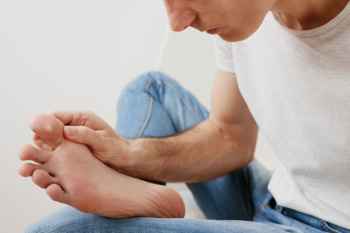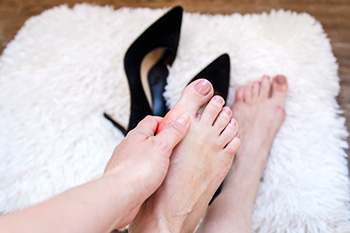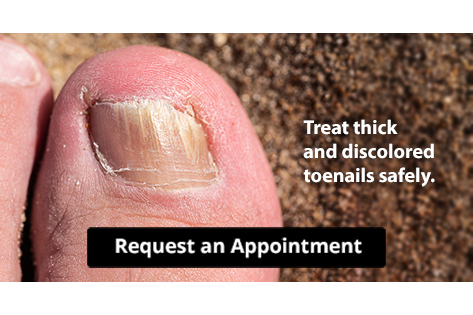Items filtered by date: February 2025
Various Types of Foot Pain

Foot pain can stem from several conditions, each with its own symptoms and treatments. Flat feet occur when the arches of the feet collapse, leading to pain in the arch or heel, particularly after standing for long periods of time.This can cause a feeling of tired, achy feet. Clubfoot is a congenital condition where the foot is twisted inward and downward, making it difficult to walk. Treatment usually involves stretching, casting, or surgery, depending on severity. Bunions are bony bumps that form at the base of the big toe, often due to wearing tight footwear or genetic factors. They cause pain, swelling, and difficulty finding shoes that fit comfortably. A podiatrist can help by diagnosing the cause of your foot pain. Treatment options include custom orthotics, stretching exercises, pain management, or surgery, if necessary. For flat feet, a podiatrist may recommend special insoles, while bunion treatments might include surgical correction. If you are experiencing foot pain, it is suggested that you schedule an appointment with a podiatrist for relief and proper care.
Foot Pain
Foot pain can be extremely painful and debilitating. If you have a foot pain, consult with Gregory Kranzusch, DPM from Foot and Ankle Center of St. Charles County. Our doctors will assess your condition and provide you with quality foot and ankle treatment.
Causes
Foot pain is a very broad condition that could be caused by one or more ailments. The most common include:
- Bunions
- Hammertoes
- Plantar Fasciitis
- Bone Spurs
- Corns
- Tarsal Tunnel Syndrome
- Ingrown Toenails
- Arthritis (such as Gout, Rheumatoid, and Osteoarthritis)
- Flat Feet
- Injury (from stress fractures, broken toe, foot, ankle, Achilles tendon ruptures, and sprains)
- And more
Diagnosis
To figure out the cause of foot pain, podiatrists utilize several different methods. This can range from simple visual inspections and sensation tests to X-rays and MRI scans. Prior medical history, family medical history, and any recent physical traumatic events will all be taken into consideration for a proper diagnosis.
Treatment
Treatment depends upon the cause of the foot pain. Whether it is resting, staying off the foot, or having surgery; podiatrists have a number of treatment options available for foot pain.
If you have any questions, please feel free to contact our office located in St. Charles, MO . We offer the newest diagnostic and treatment technologies for all your foot care needs.
Key Facts About Plantar Warts

Plantar warts are small, hard growths that appear on the bottom of the feet, often on the heel or the ball of the foot. They are caused by the human papillomavirus, or HPV, which enters the skin through tiny cuts or abrasions. While these warts are generally harmless, they can be painful, especially when pressure is applied while standing or walking. Plantar warts are contagious and can spread from person to person, typically in damp, warm environments like public showers or swimming pools. These warts often appear as rough, thickened areas of skin with tiny black dots, which are small blood vessels. Although they may go away on their own, plantar warts can take months or even years to disappear. Relief options include mild removal applications, cryotherapy, or in some cases, surgical removal. Plantar warts can cause pain and discomfort, and may lead to difficulty in completing daily activities. If you have developed this condition, it is suggested that you promptly contact a podiatrist who can offer you effective treatment and relief solutions.
Plantar warts can be very uncomfortable. If you need your feet checked, contact Gregory Kranzusch, DPM from Foot and Ankle Center of St. Charles County. Our doctors will assist you with all of your foot and ankle needs.
About Plantar Warts
Plantar warts are the result of HPV, or human papillomavirus, getting into open wounds on the feet. They are mostly found on the heels or balls of the feet.
While plantar warts are generally harmless, those experiencing excessive pain or those suffering from diabetes or a compromised immune system require immediate medical care. Plantar warts are easily diagnosed, usually through scraping off a bit of rough skin or by getting a biopsy.
Symptoms
- Lesions on the bottom of your feet, usually rough and grainy
- Hard or thick callused spots
- Wart seeds, which are small clotted blood vessels that look like little black spots
- Pain, discomfort, or tenderness of your feet when walking or standing
Treatment
- Freezing
- Electric tool removal
- Laser Treatment
- Topical Creams (prescription only)
- Over-the-counter medications
To help prevent developing plantar warts, avoid walking barefoot over abrasive surfaces that can cause cuts or wounds for HPV to get into. Avoiding direct contact with other warts, as well as not picking or rubbing existing warts, can help prevent the further spread of plantar warts. However, if you think you have developed plantar warts, speak to your podiatrist. He or she can diagnose the warts on your feet and recommend the appropriate treatment options.
If you have any questions please feel free to contact our office located in St. Charles, MO . We offer the newest diagnostic and treatment technologies for all your foot and ankle needs.
Stop Your Toenail Fungus
How Weight Can Affect Your Feet

Excess weight can significantly affect the feet, toes, and ankles, as they bear the body’s weight during standing, walking, and other activities. Increased pressure on the feet can lead to pain, particularly in the heels and forefoot, as well as deformities like hammer toes, claw toes, and bunions. These issues may arise because excess weight can alter how weight is distributed across the foot, leading to strain on the arches and possibly resulting in flat feet. Over time, extra weight can also affect mobility and balance, making everyday tasks more challenging. Research suggests that the likelihood of experiencing foot pain increases with higher body mass index, or BMI. A podiatrist can perform a comprehensive evaluation to diagnose weight-related foot issues and offer treatment options to reduce pain, enhance mobility, and prevent further complications. If you have foot problems that may be related to your weight, it is suggested that you schedule an appointment with a podiatrist for a diagnosis and treatment options.
Obesity has become very problematic at this point in time and can have extremely negative effects on the feet. If you’re an obese individual and are concerned about your feet, contact Gregory Kranzusch, DPM from Foot and Ankle Center of St. Charles County. Our doctors can provide the care you need to keep you pain-free and on your feet.
Obesity and Your Feet
Since your feet are what support your entire weight when standing, any additional weight can result in pain and swelling. Being overweight is one of the main contributors to foot complications.
Problems & Complications
Extra Weight – Even putting on just a few extra pounds could create serious complications for your feet. As your weight increases, your balance and body will shift, creating new stresses on your feet. This uneven weight distribution can cause pain, even while doing the simplest tasks, such as walking.
Diabetes – People who are overweight are at serious risk of developing type-2 diabetes, which has a drastic impact on the health of your feet. As you get older, your diabetes might worsen, which could lead to loss of feeling in your feet, sores, and bruises. You could also become more prone to various infections.
Plantar fasciitis – Pressure and stress that is placed on muscles, joints, and tendons can trigger plantar fasciitis, which is an inflammation of tissue that forms along the bottom of the foot.
If you have any questions please feel free to contact our office located in St. Charles, MO . We offer the newest diagnostic and treatment technologies for all your foot and ankle needs.
Finding Shoes That Offer Bunion Relief

Choosing the right shoes is essential for people with bunions, as these bony protrusions on the side of the big toe joint can lead to chronic discomfort and mobility issues. Shoes that provide relief should have a wide, roomy toe box to reduce pressure on the bunion and surrounding toes. Soft, flexible materials like leather or mesh can help prevent irritation. Heels no higher than two inches and cushioned soles offer added support and stability. Extra-depth shoes may be beneficial for accommodating bunions and any associated issues such as corns or calluses. Adjustable features, like laces or straps, allow for a better fit as feet change over time. Orthotic inserts can be added to relieve pressure, support the arch, and improve alignment. A podiatrist can guide patients in selecting the most appropriate footwear or, if needed, recommend custom-made shoe inserts to address severe deformities. If you have problematic or painful bunions, it is suggested that you schedule an appointment with a podiatrist for a diagnosis and treatment options, which may include shoe selection.
Finding a properly-fitting shoe is important in reducing injuries and preventing foot problems. For more information about treatment, contact Gregory Kranzusch, DPM from Foot and Ankle Center of St. Charles County. Our doctors will treat your foot and ankle needs.
Proper Shoe Fitting
A common concern when it comes to foot health, having properly fitted shoes can help prevent injuries to the foot. Out feet affect our posture and gait, which in turn affects the biomechanics and overall bodily structure. With 33 joints, 26 bones, and over 100 ligaments, the potential for serious injury is much greater than one realizes. Although the feet cease growth in adulthood, they still change shape as they mature. Here are some factors to consider when it comes to investing in proper fitting shoes:
- Be sure the shoes fit correctly right away
- Ensure the ball of your foot fits comfortably in the widest portion of the shoes
- Even though they may look fashionable, improper fitting shoes can either create adverse conditions or exacerbate existing ones you may already have
- Walk along a carpeted surface to ensure the shoes comfortably fit during normal activity
Keeping in mind how shoes fit the biomechanics of your body, properly-fitting shoes are vitally important. Fortunately, it is not difficult to acquire footwear that fits correctly. Be sure to wear shoes that support the overall structure of your body. Do your feet a favor and invest in several pairs of well-fitted shoes today.
If you have any questions please feel free to contact our office located in St. Charles, MO . We offer the newest diagnostic and treatment technologies for all your foot and ankle needs.

